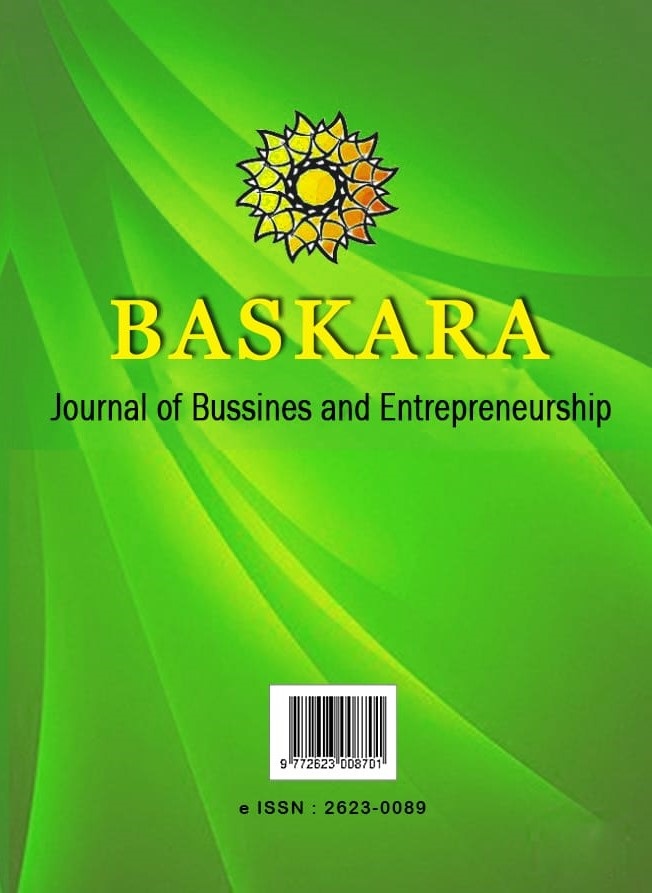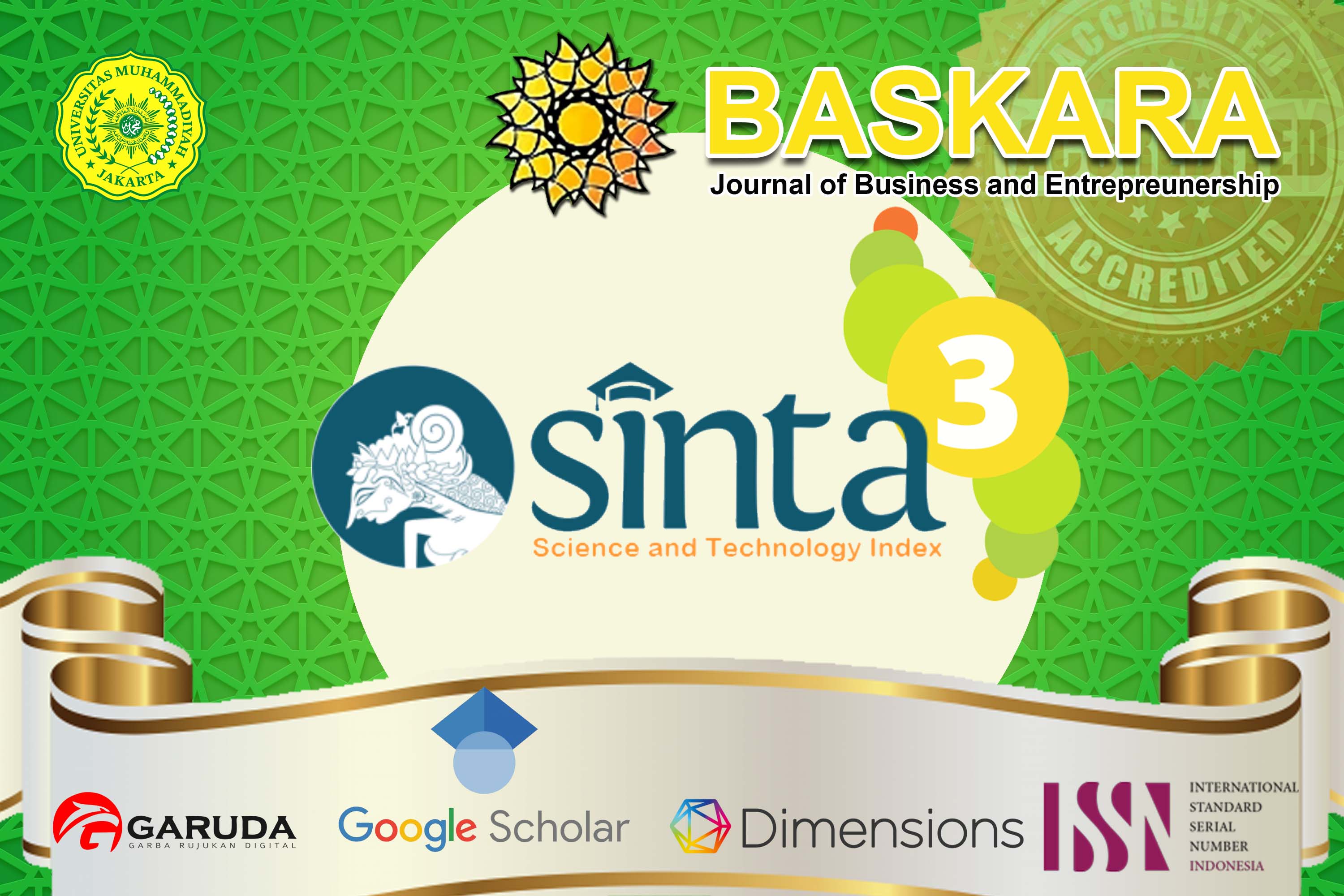Mobile Banking: Drives Changes in The Consumptive Behavior of Generation Z in Batu Ampar Kramat Jati
DOI:
https://doi.org/10.54268/baskara.v7i1.23116Keywords:
Consumptive Behaviour, Mobile banking, Generation Z, TechnologyAbstract
AbstractThe rapid development of technology has led to various changes in the banking industry, including the rise of electronic payments such as mobile banking. This study aims to understand the impact of mobile banking on the consumption behavior of Generation Z in the Batu Ampar area of Kramat Jati. The study collected quantitative data through questionnaires distributed to 100 respondents with sampling techniques, namely non-probability sampling in the form of purposive sampling. The data was then analyzed using the SPSS 25 (Statistical Package for the Social Sciences) application. The results showed that there is a significant relationship between mobile banking and consumptive behavior. The regression test revealed that for every 1% increase in mobile banking usage, the value of consumption behavior increases by 1.471. Through the Product Moment Correlation Analysis, it is known that R count 0.05 ≥ 0.000 means that there is a significant relationship between Mobile Banking (X) and Consumptive Behavior (Y). In the F test, it is obtained that F count is 36.417> F table, namely 3.94, which can be seen that variable X (Mobile Banking) has an effect on variable Y (Consumptive Behavior) which means Hα is accepted and H0 is rejected by having an influence value of 27.1% of the consumption behavior can be attributed to mobile banking, while the remaining 72.9% is influenced by other factors not considered in this study. Overall, these findings highlight the influence of mobile banking on the consumption behavior of Generation Z.References
‘Ainy, Z. N. (2020). Pengaruh E-Commerce Terhadap Perilaku Konsumtif Masyarakat di Kelurahan Karang Panjang Kota Ambon. JPEK: Jurnal Pendidikan Ekonomi Dan Kewirausahaan, 4(2), 226–235. https://doi.org/10.29408/jpek.v4i2.2672
Ananta, Y. (2019). Riset: Pengguna Mobile Banking Lebih Boros Tetapi Loyal. In CNBC Indonesia. https://www.cnbcindonesia.com/tech/20190211193129-37-54934/riset-pengguna-mobile-banking- lebih-boros-tetapi-loyal
Anjani, C., & Darto, D. (2023). Financial Literacy, Income and Self-Control on Financial Management Behavior of Generation Z. BASKARA: Journal of Business and Entrepreneurship, 5(2), 152. https://doi.org/10.54268/baskara.v5i2.16363
Ardana, F. A. (2021). Pengaruh Gaya Hidup, Konformitas, Konsep Diri, dan Literasi Ekonomi Terhadap
Perilaku Konsumtif: Studi Pada Mahasiswa Fakultas Ekonomi di Purwokerto. Bachelor thesis, Universitas Muhammadiyah Purwokerto.
Axel Hernandez, F. D. (2022). Pengaruh Mobile Banking Terhadap Kepuasan Nasabah Bank dalam Transaksi Sehari-Hari. Jurnal Informatika Kesatuan, 2(2), 189–198. https://doi.org/10.37641/jikes.v2i2.1458
Davis, F. D. (1989). Perceived Usefulness, Perceived Ease of Use, and User Acceptance of Information Technology. MIS Quarterly. https://doi.org/https://doi.org/10.2307/249008
Davis, F. D. (1993). User Acceptance of Information Technology: System Characteristics, User Perceptions and Behavioral Impacts. International Journal of Man-Machine Studies, 38(3), 475–487. https://doi.org/10.1006/imms.1993.1022
Dewi, L. G. K., Herawati, N. T., & Adiputra, I. M. P. (2021). Penggunaan E-Money Terhadap Perilaku Konsumtif Mahasiswa Yang Dimediasi Kontrol Diri. EKUITAS: Jurnal Ekonomi Dan Keuangan, 5(1), 1–19. https://doi.org/10.24034/j25485024.y2021.v5.i1.4669
Divisi Sumber Daya Manusia dan Organisasi Bawaslu Jombang. (2020). Generasi Z Mengawasi Pilkada 2020. Tebuireng Institute. https://www.google.co.id/books/edition/_/V6PWDwAAQBAJ?hl=id&sa=X&ved=2ahUKEwjZoMios O6EAxUVi2MGHQ2tA9gQ8fIDegQIDRAE
Eliza, M. S., Astuti, S., & Safitri, C. (2023). Pengaruh Literasi Finansial Terhadap Keberlangsungan Usaha pada UMKM. JPEK: Jurnal Pendidikan Ekonomi dan Kewirausahaan, 7(2), 398–408. https://doi.org/10.29408/jpek.v7i2.19125.
Enrico, M., Le Roux, G., Heimbürger, L. E., Van Beek, P., Souhaut, M., Chmeleff, J., & Sonke, J. E. (2017). Holocene Atmospheric Mercury Levels Reconstructed from Peat Bog Mercury Stable Isotopes. Environmental Science and Technology, 51(11), 5899–5906. https://doi.org/10.1021/acs.est.6b05804
Fadlan, A. (2018). Pengaruh Persepsi Kemudahan dan Persepsi Kegunaan Terhadap Penggunaan Mobile Banking: Studi Pada Mahasiswa Pengguna Mobile Banking Universitas Brawijaya. Bachelor thesis, Universitas Brawijaya.
Foramitti, J. (2023). A Framework for Agent-Based Models of Human Needs and Ecological Limits. Ecological Economics, 204(Part A), 1–12. https://doi.org/10.1016/j.ecolecon.2022.107651.
Hadi, S., & Novi, N. (2015). Faktor-Faktor yang Mempengaruhi Penggunaan Layanan Mobile Banking. Optimum: Jurnal Ekonomi Dan Pembangunan, 5(1), 55. https://doi.org/10.12928/optimum.v5i1.7840 Hidayah, R. W. (2015). Perilaku Konsumtif dalam Membeli Produk Fashion pada Mahasiswa Putri di Surakarta. Bachelor thesis, Universitas Muhammadiyah Surakarta.
Herawati, N. S. (2015). Pengaruh Literasi Keuangan dan Faktor Demografi Terhadap Perilaku Konsumtif Mahasiswa Bisnis di Surabaya. Bachelor thesis, Universitas Hayam Wuruk Perbanas.
Hung, Angela and Parker, Andrew M. and Yoong, Joanne, Defining and Measuring Financial Literacy (September 2, 2009). RAND Working Paper Series WR-708, Available at SSRN: https://ssrn.com/abstract=1498674 or http://dx.doi.org/10.2139/ssrn.1498674
Imansari, N. I. (2020). Praktikum Mengenai Kebutuhan Atau Utilitas Dalam Khidupan Sehari-hari. Jurnal Masharif Al-Syariah: Jurnal Ekonomi Perbankan Syariah, 5(2), 90.
Iriani, A. F. (2018). Minat Nasabah dalam Penggunaan Mobile Banking Pada Nasabah Bank Syariah Mandiri Kota Palopo. DINAMIS- Journal of Islamic Management and Business, 2(2), 100.
Juliana, J., Marlina, R., Saadillah, R., & Mariam, S. (2018). Pertumbuhan dan Pemerataan Ekonomi Perspekif Politik Ekonomi Islam. Amwaluna: Jurnal Ekonomi Dan Keuangan Syariah, 2(2), 120–131. https://doi.org/10.29313/amwaluna.v2i2.3824
Kompasiana.com. (2023). Dompet Digital Membuat Hidup Kita Menjadi Malas dan Boros. https://www.kompasiana.com/asep36903/657c198ec57afb208a4c1c33/dompet-digital-membuat-hidup- kita-menjadi-malas-dan-boros
Kotler, P., & Keller, K. (2016). Marketing Management 15th Edition. London: Pearson
Kuriaty, H. (2018). Pelayanan Nasabah Bri Cabang Buntok Menggunakan Aplikasi Mobile Banking Pada Tahun 2017. Anterior Jurnal, 17(2), 100–107. https://doi.org/10.33084/anterior.v17i2.4
Lestari, K. (2022). Literature Review Determinasi Volume Transaksi di Masa Pandemi Covid 19: Strategi, Teknologi Dan Mobile Banking. JEMSI: Jurnal Ekonomi Manajemen Sistem Informasi, 3(3), 361–369. https://doi.org/10.31933/jemsi.v3i3.
Lutfiah, L., Basri, M., & Kuswanti, H. (2022). Faktor-Faktor Yang Mempengaruhi Perilaku Konsumtif Mahasiswa Pendidikan Ekonomi Ppapk Fkip Universitas Tanjungpura Pontianak. Jurnal Pendidikan Dan Pembelajaran Khatulistiwa (JPPK), 11(3), 1–10. https://doi.org/10.26418/jppk.v11i3.53456
Mihartinah, D., & Coryanata, I. (2019). Pengaruh Sikap Terhadap Perilaku, Norma Subjektif, Dan Kontrol Perilaku Persepsian Terhadap Niat Mahasiswa Akuntansi Untuk Mengambil Sertifikasi Chartered Accountant. Jurnal Akuntansi, 8(2), 77–88. https://doi.org/10.33369/j.akuntansi.8.2.77-88
Mujahidah, A. N. (2020). Analisis Perilaku Konsumtif Dan Penanganan (Studi Kasus Pada Satu Peserta Didik di SMK Negeri 8 Makasar). Analisis Perilaku Konsumtif Dan Penanganan, 1–18. http://eprints.unm.ac.id/id/eprint/18970%0A
Mutthaqin, M. S., Wati, P., & Batubara, C. (2023). Pengaruh Spaylater dalam Online Shop terhadap Perilaku Konsumtif Pada Mahasiswa Muslim di FEBI UINSU. Jurnal Masharif Al-Syariah: Jurnal Ekonomi Dan Perbankan Syariah, 8(2). https://doi.org/10.30651/jms.v8i2.19402
Pertiwi, N. W. D., & Ariyanto, D. (2017). Penerapan Model UTAUT 2 untuk Menjelaskan Minat dan Perilaku Penggunaan Mobile Banking. E-Jurnal Akuntansi Universitas Udayana, 18(2), 1369–1397.
Pratama, A., Saleh, F. M., Zahra, F., & Afdhalia, N. (2019). Faktor-Faktor yang Mempengaruhi Niat dalam Menggunakan Mobile Banking. Jurnal Akun Nabelo: Jurnal Akuntansi Netral, Akuntabel, Objektif, 2(1), 204–216. http://dx.doi.org/10.22487/j26223090.2019.v2.i1.13600.
Rana, S., & Shrivastava, A. K. (2022). Doing Business in Emerging Markets. London: Routledge India.
Rudiatin, E., & Ramadhan, A. I. (2018). Kekuatan Moral dan Budaya, Mendukung Perekonomian Indonesia: Sebuah Gambaran Usaha Kecil dan Menengah. BASKARA: Journal of Business & Entrepreneurship, 1(1), 21–34. https://jurnal.umj.ac.id/index.php/baskara/article/view/3117
Saraswati, A. M., & Nugroho, A. W. (2021). Perencanaan Keuangan dan Pengelolaan Keuangan Generasi Z di Masa Pandemi Covid 19 melalui Penguatan Literasi Keuangan. Warta LPM, 24(2), 309–318. https://doi.org/10.23917/warta.v24i2.13481
Straub, D. G. and D. W. (1986). Gender Differences in the Perception and Use of E-Mail: An Extension to the Technology Acceptance Model. Interchange, 17(2), 3–8. https://doi.org/10.1007/BF01807463
Sugiyono, S. (2021). Metode Penelitian Kuantitatif, Kualitatif, dan R&D. Bandung: Penerbit Alfabeta
Sulistiyarini, S. (2012). Pengaruh Minat Individu Terhadap Penggunaan Mobile Banking: Model Kombinasi Technology Acceptance Model (TAM) dan Theory of Planned Behavior (TPB). Jurnal Ilmiah Mahasiswa FEB, 1(2), 1–20.
Utari, P., Fitri, A., Setyanto, E., & Henny, C. (2020). Belanja On-Line Mahasiswa di Era Pandemi Covid-19: Modifikasi Perilaku Konsumen. Islamic Communication Journal, 5(2), 143. https://doi.org/10.21580/icj.2020.5.2.6450
Wibowo, A. (2017). Kajian Tentang Perilaku Pengguna Sistem Informasi Dengan Pendekatan Technology Acceptance Model (TAM). In Proceeding Book of Konferensi Nasional Sistem Informasi 2008: Indonesia Modern dalam Budaya Informasi, Yogyakarta 14-15 January, Universitas Sanata Dharma Yogyakarta.
Widyarini, N., & Sari, E. S. (2009). Kunci Pengembangan Diri. Jakarta: Elex Media Komputindo.
Yahya, A. (2021). Determinan Perilaku Konsumtif Mahasiswa. Jurnal Pengembangan Wiraswasta, 23(1), 37. https://doi.org/10.33370/jpw.v23i1.506
Yahyapour, N. (2008). Determining Factors Affecting Intention to Adopt Banking Recommender System: Case of Iran. Master thesis, Lulea University of Technology.
Yanti, S. D., Astuti, S., & Safitri, C. (2023). Pengaruh Pengalaman Belanja Online Dan Kepercyaan Terhadap Minat Beli Ulang di Tiktok Shop: Studi Kasus Mahasiswa FKIP UHAMKA 2018. Jurnal EMT KITA, 7(1), 47–61. https://doi.org/10.35870/emt.v7i1.728
Downloads
Published
Issue
Section
License
In order for Baskara: Journal of Business and Entrepreneurship to publish and disseminate research articles, we need publishing rights (transfered from author(s) to publisher). This is determined by a publishing agreement between the Author(s) and Baskara Journal. This agreement deals with the transfer or license of the copyright of publishing to Baskara: Journal of Business and Entrepreneurship, while Authors still retain significant rights to use and share their own published articles. Baskara : Journal of Business and Entrepreneurship supports the need for authors to share, disseminate and maximize the impact of their research and these rights, in any databases.
As a journal Author, you have rights for a large range of uses of your article, including use by your employing institute or company. These Author rights can be exercised without the need to obtain specific permission. Authors publishing in Baskara : Journal of Business and Entrepreneurship have wide rights to use their works for teaching and scholarly purposes without needing to seek permission, including:
- use for classroom teaching by Author or Author's institution and presentation at a meeting or conference and distributing copies to attendees;
- use for internal training by author's company;
- distribution to colleagues for their reseearch use;
- use in a subsequent compilation of the author's works;
- inclusion in a thesis or dissertation;
- reuse of portions or extracts from the article in other works (with full acknowledgement of final article);
- preparation of derivative works (other than commercial purposes) (with full acknowledgement of final article);
- voluntary posting on open web sites operated by author or author’s institution for scholarly purposes.
Copyright Transfer Agreement for Publishing (Publishing Right)
The Authors who submit manuscript has to understand that if accepted for publication, mean that all copyright and publishing right of the article shall be assigned/transferred to Baskara: Journal of Business and Entrepreneurship as assigned publisher.
- CC BY-NC: This license allows reusers to distribute, remix, adapt, and build upon the material in any medium or format for noncommercial purposes only, and only so long as attribution is given to the creator.
It includes the following elements:
BY ![]() – Credit must be given to the creator
– Credit must be given to the creator
NC ![]() – Only noncommercial uses of the work are permitted
– Only noncommercial uses of the work are permitted
Baskara (C) Copyright (2022):
BASKARA: Journal of Business and Entrepreneurship by https://jurnal.umj.ac.id/index.php/baskara
is licensed under a Creative Commons Attribution-NonCommercial 4.0 International License








